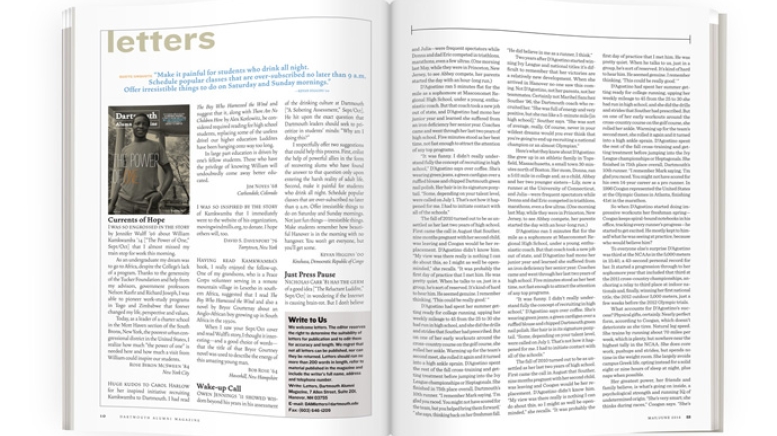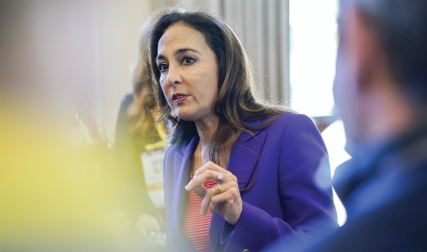Currents of Hope I was so engrossed in the story by Jennifer Wulff ’96 about William Kamkwamba ’14 [“The Power of One,” Sept/Oct] that I almost missed my train stop for work this morning. As an undergraduate my dream was to go to Africa, despite the College’s lack of a program. Thanks to the generosity of the Tucker Foundation and help from my advisors, government professors Nelson Kasfir and Richard Joseph, I was able to pioneer work-study programs in Togo and Zimbabwe that forever changed my life, perspective and values. Today, as a leader of a charter school in the Mott Haven section of the South Bronx, New York, the poorest urban congressional district in the United States, I realize how much “the power of one” is needed here and how much a visit from William could inspire our students.
Rose Byron McSween ’84 New York City
Huge kudos to Carol Harlow for her inspired initiative recruiting Kamkwamba to Dartmouth. I had read The Boy Who Harnessed the Wind and suggest that it, along with There Are No Children Here by Alex Kotlowitz, be considered required reading for high school students, replacing some of the useless drivel our higher education Luddites have been hanging onto way too long. In large part education is driven by one’s fellow students. Those who have the privilege of knowing William will undoubtedly come away better educated.
Jim Noyes ’68 Carbondale, Colorado
I was so inspired by the story of Kamkwamba that I immediately went to the website of his organization, movingwindmills.org, to donate. I hope others will, too.
David S. Davenport ’76 Tarrytown, New York
Having read Kamkwamba’s book, I really enjoyed the follow-up. One of my grandsons, who is a Peace Corps volunteer serving in a remote mountain village in Lesotho in southern Africa, suggested that I read The Boy Who Harnessed the Wind and also a novel by Bryce Courtenay about an Anglo-African boy growing up in South Africa in the 1930s. When I saw your cover and read Wulff’s story, I thought it interesting—and a good choice of words—that the title of that Bryce Courtney novel was used to describe the energy of this amazing young man.
Bob Rose ’64 Haverhill, New Hampshire
Wake-up Call Owen Jennings ’11 showed wisdom beyond his years in his assessment of the drinking culture at Dartmouth [“A Sobering Assessment,” Sept/Oct]. He hit upon the exact question that Dartmouth leaders should seek to prioritize in students’ minds: “Why am I doing this?” I respectfully offer two suggestions that could help this process. First, enlist the help of powerful allies in the form of recovering alums who have found the answer to that question only upon entering the harsh reality of adult life. Second, make it painful for students who drink all night. Schedule popular classes that are over-subscribed no later than 9 a.m. Offer irresistible things to do on Saturday and Sunday mornings. Not just fun things—irresistible things. Make students remember how beautiful Hanover is in the morning with no hangover. You won’t get everyone, but you’ll get some.
Kevan Higgins ’00 Kinshasa, Democratic Republic of Congo
Just Press Pause Nicholas Carr ’81 has the germ of a good idea [“The Reluctant Luddite,” Sept/Oct] in wondering if the Internet is causing brain-rot. But I don’t believe it’s the Internet per se that’s to blame; rather it’s the nature of instant information, which is utterly addictive. Whereas it used to take some time to run to the library or bookstore, now we can get the answer to almost any question, trivial or not, in seconds, so when’s the time for deep thought? Internet games are even more addictive. As with any potential addiction, use of the Internet must be well managed for one to lead a well-balanced life. Carr is probably right in believing we’re wired to multitask rather than deep-think, but I’d say the civilization of mankind has been all about fighting off that gut-level desire to multitask and carving out the time to think more deeply, which has enabled the best minds to achieve incredible things throughout history. As a one-thing-at-a-time person, I’ve argued for many years with multitaskers about whether one can achieve truly great things in a multitasking environment. No decision there, but I am concerned about the apparently inexorable slide toward more and more multitasking in our society, especially in the lives of young people. There are few career paths that utilize such skills. Most demand far more.
John Higbee ’69 San Ysidro, California
Believe It! I enjoyed the recent graphic feature “The Unbelievable Truth” [Sept/Oct] about the storied history of the Robert Ripley donation to the College. As assistant director of the Hood Museum of Art, I also thought readers should know that the donation is now part of the Hood’s permanent collection and even played a prominent role in a recent major exhibition. In 2005 the museum commissioned contemporary artist, curator and MacArthur Foundation Fellow Fred Wilson to create an exhibition based on its collection of 65,000 objects. Free to gather and interpret as he saw fit, Wilson “mined” the museum for things that collectively exposed the fascinating intersections among the objects in the Hood’s care, the history of Dartmouth College and events large and small in the greater world. His title for the exhibition was Bob Marley meets Robert Ripley: So Much Trouble in the World—Believe It or Not! Wilson’s poignant, perceptive and at times hilarious metacommentary also made a larger statement about the purpose of having a museum on a college campus in the first place: to make objects of cultural and historical significance available to students, faculty, alumni, artists, scholars and the visiting public so that we might continue to learn about ourselves and each other for generations to come.
Juliette Bianco ’94 Hanover
Eye of the Beholder America is not queer. Michael Bronski calling it “queer” and “evil” [“America Is Queer,” Sept/Oct] does not make it so. “To become American…is to be a little queer,” Bronski says. What rubbish! It is just another attempt at self-justification from the world of gender studies.
Doug Kingsley ’84, Th’85 Sherborn, Massachusetts
Political Offenses To hear our six Dartmouth politicos say there are not many good ideas to bring down healthcare costs is, to say the least, disheartening [“The Dartmouth Caucus,” July/Aug]. If these elected representatives truly believe that, they have not been doing their homework. I recommend the works of Alan Enthoven and Henry Aaron, in particular. There is no doubt that the federal government has the brainpower, market power, technology and infrastructure it needs to purchase high-quality healthcare for Medicare and Medicaid beneficiaries at a reasonable price. The only ingredient lacking in the equation is a political system that represents the interests of patients and taxpayers over the interests of those who benefit economically from the wasteful system we currently have. It would have been refreshing to hear the politicos acknowledge that.
Brian Burwell ’73 Arlington, Massachusetts
Winners or Losers? I was distressed to read the interview with Dean of Admissions and Financial Aid Maria Laskaris ’84 [“Nuanced Decisions,” May/June]. Specifically, Dean Laskaris says, in response to a question about “reserved” spots for athletes, that approximately one-fifth of each incoming class is chosen for such a slot: “We need roughly 205 to 210 student-athletes to make sure that we can field successful teams.” Dartmouth’s traditional values in admitting scholar-athletes should reflect only the ethic of the modern Olympic Games founder, Pierre de Coubertin: “The important thing in life is not to triumph but to compete.”
Dan Anzel ’55 Los Angeles
Generational Divide I found the results of the student survey featured in your Mar/Apr issue [“Generation Now”] shocking as they relate to matters of morality. If the 400 students who responded to the survey are typical of the country’s college students, we are in deep trouble. Fortunately Catholic students have an oasis in Aquinas House. I propose that DAM conduct a similar survey of Dartmouth professors covering social, political, moral and other subjects. In the case of politics, I would guess that more than 60 percent are liberal Democrats as is the trend across all U.S. college campuses. I further suggest the school review that part of its curriculum that deals with such topics as theology, ethics and religion, and maybe add a course on morality. If I were a parent of a Dartmouth student today, I would be very disturbed at the survey results.
C. Welles Fendrich Jr. ’46, Tu’49 Roanoke, Texas




